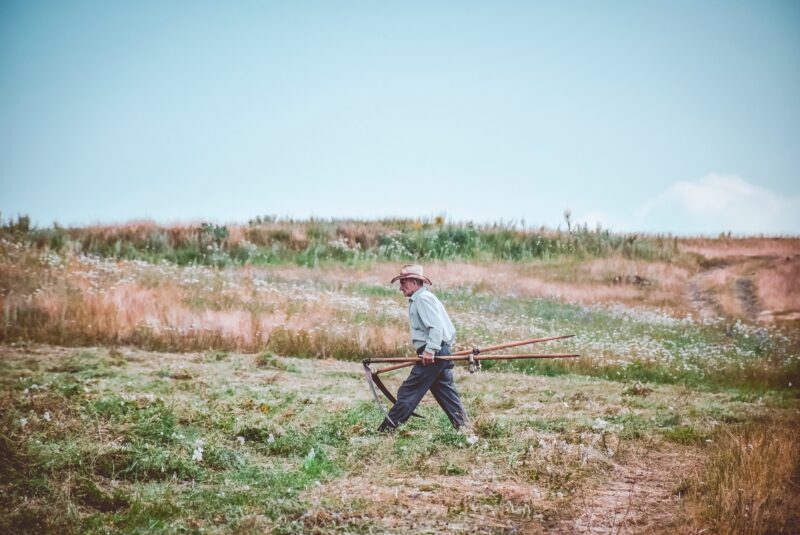A good tree doesn’t produce bad fruit…
A sower went out to sow…
Consider a grain of wheat…
In story after story, Jesus used scenes from everyday farm life to illustrate His points about the gospel and the kingdom of God. This shouldn’t be too surprising. Most of Jesus’ listeners would have been farmers themselves or, at least, very familiar with farming. It would have been very easy, not to mention effective, to be able to point to a farmer in the field, shepherds tending nearby flocks, or the numerous plants growing around them and reference the heart of God or another gospel truth. The illustrations Jesus needed to make His points were literally all around Him.
For a long time, these stories worked without much thought or explanation. Our churches were filled with farmers. Remember, the reason we started our worship services at 11 in the morning was to give our farmers time to take care of their morning chores, and then, get to church. But more and more of us have moved to the cities. Fewer and fewer of us grew up on farms, and thus, we miss a lot of subtle points Jesus is making in some of His stories. Jesus wouldn’t have had to fill in all of the details because His listeners would have gotten it.
I’m not sure we do. For one thing, farming is hard work. Farmers work 365 days a year, regardless of the weather. Animals have to be fed, crops have to be fertilized and watered, and it doesn’t matter how the farmer feels on that particular day. The work still has to be done. In the same way, most of us don’t understand how hard life is. We seemed to be surprised by the hard work required by life. Building a good life is harder work, and every day, just like the farmer, we have to show up and do the work. Every day, relationships have to be tended. Weeds have to be removed, watered and fertilizer added. Neglect a relationship and just like a field left unplowed, weeds will overrun everything and whatever was planted will die.
Farming takes time. You can’t speed up nature. Cows, like people, reproduce in about nine months. You can speed that up. Corn takes anywhere from 90 to 100 days to be ready to be harvested. Nature takes its own time. A million factors can control the time it takes for the crop to ripen. The amount of rain, the warmth of the days, the cool of the nights, soil condition, insects – the list goes on and on. On some days, the only thing the farmer can do is sit and wait.
Patience is a required virtue for a farmer. Patience is a needed virtue for life. Some things just take time. Some things dictate their own schedule. A baby will learn to walk when the baby is ready. Not before. Children, in fact, will do almost everything they do in their own time. Every parent has a horror story of trying to rush a child into something before they were ready. All of us have endured small disasters because we tried to do something before the moment was ready. We pushed to repair a relationship before there had been time for true healing. Farming takes time. Life takes time. The smart farmer knows when the moment is ready. So does the wisest of us in living.
The farmer knows the importance of good dirt. Rocks are removed from the fields. PH has to be balanced. Dirt has to be turned over, and sometimes, fields need to rest. The farmer knows how to look at the dirt, and maybe runs some tests to make sure the dirt is ready to grow crops.
I’m not sure any of us spend enough time checking the quality of the soil in our own lives. When Jesus told the parables of the soils, it didn’t take long for His listeners to understand all of the soils were in the same field. There are parts of our lives that need a different kind of attention. Grudges, like rocks, have to be carried out of the field. Weeds of resentment and disobedience have to be pulled out. There are parts of our lives that aren’t ready to be planted. There are fields not ready to be cultivated. Our lives, like the farmer’s fields, need a little work before the seeds are planted.
You can’t skimp on the quality of seeds. Weeds grow everywhere and all of the time. The farmer has something to do every day. The unexamined field soon becomes unusable. The unexamined life soon becomes useless for service in the kingdom.
No wonder Jesus talked so much about farming. The day-to-day chores, tasks, and the attention required to the smallest details made agriculture an unforgettably rich metaphor for Jesus and His teachings. They are a good reminder of what is required from us every day of our own lives.
The animals have to be tended. The fields have to be checked. The work is never done.
And it’s never done for us. Relationships have to be tended. Friends and family have to be cared for. Our own issues of depression, loneliness, and inferiority have to be dealt with before our soils are ready for the Spirit to plant the Good Seed of the Kingdom.
The sun will come up in the morning, and rain or shine, like the farmer, you and I will have to get up and go work in our fields. Winter will soon come, and we won’t have time to work. It’s one of the hard lessons Jesus – and agriculture – will keep on teaching us.









